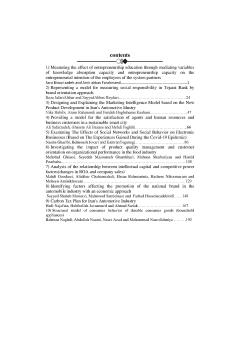Identifying Factors Affecting National Brand Promotion in the Automotive Industry with Economic Approach
Subject Areas : Marketingseyed shahab mousavi 1 , mahmud samiei nasr 2 , farhad hosseinzadeh lotfi 3
1 - Department of Business Management, Science and Research Unit, Islamic Azad University, Tehran, Iran
2 - Department of Business Management, Science and Research Unit, Islamic Azad University, Tehran, Iran
3 - Department of Statistics, Science and Research Unit, Islamic Azad University, Tehran, Iran
Keywords: Automobile industry, Economic Development, National Brand, foundation data,
Abstract :
The aim of the current research is to identify the influencing variables on promoting the national brand in the automobile industry with an economic approach using the ground theory method. The current research was conducted using qualitative method (qualitative content analysis) and fuzzy Delphi analysis. Finally, using the fuzzy Delphi analysis, the factors extracted from the interviews with experts were analyzed and the final qualitative model was designed. Based on fuzzy Delphi analysis among the components: choosing the best technology transfer strategy in order to promote national branding in the automobile industry in line with economic development with the Cripps number (0.917), considering key economic factors in the country in order to promote branding National in the automotive industry with the Cripps number (0.903), according to experts, they have the highest amount of these components. In the end, 34 components and 88 indicators were confirmed, mostly causal factors or preconditions, intervening factors, background factors, strategies and consequences were identified
_|1) اردلان، امين؛ وظیفه دوست، حسین؛ نیکومرام، هاشم، (۱۳۸۸)، برنامهریزی آینده ایران با برندسازی ملی، آیندهپژوهی مدیریت، شماره ۱۱۶، صص: ۱۵۳–۱۶۸
2) غفاري آشتيانی، پيمان و چارستاد، پروانه (1390) بررسی عوامل موثر بر رفتار مصرفکنندگان در ترجيح برندهاي خارجی به برندهاي داخلی (مطالعه موردي: دانشجویان) مجله مدیریت بازاریابی، شماره 8، بهار و تابستان 1389
3) Anholt, S. (2010). Definitions of place branding – Working towards a resolution, Place Branding and Public Diplomacy 6(1), pp. 1–10.
4) Dinnie, K. (2015) Nation Branding: Concepts, Issues, Practice. London: Routledge
5) Echeverri, L., ter Horst, E., Molina, G., & Mohamad, Z. (2019). Nation Branding: Unveiling Factors that Affect the Image of Colombia from a Foreign Perspective. Tourism Planning & Development, 16 (1), 1-21.
6) Edwards, L., & Ramamurthy, A. (2017). (In) credible India? A critical analysis of India's nation branding. Communication, Culture & Critique, 10(2), 322-343.
7) Hackley, Chris (2005). Advertising and Promotion, Communicating Brands, Sage publication, London.
8) Hankinson, G. (2004). Relational network brands: Towards a conceptual model of place brands. Journal of Vacation Marketing, 10(2), 109-121.
9) Hao, A. W., Paul, J., Trott, S., Guo, C., & Wu, H. H. (2019). Two decades of research on nation branding: a review and future research agenda. International Marketing Review
10) Hoon, C. (2013). Meta-synthesis of qualitative case studies: An approach to theory building. Organizational Research Methods, 16(4), 522-556.
11) Kaufman -Scarborough Carol & Sandra Forsythe. (2009)," Current issues in retailing: Relationships and emerging opportunities Introduction to the special.
12) Kim, J., & Lee, M. (2018). Nation branding or marketization? K-Classic and Korean classical musicians in an era of globalization. International Journal of Cultural Policy, 24(6), 756-772
13) Méndez, J. I. (2013). The nation brand molecule. Journal of Product and Brand Management, 22 (7), 462-472.
14) Murti, D. C. W. (2020). Performing rural heritage for nation branding: a comparative study of Japan and Indonesia. Journal of Heritage Tourism, 15(2), 127-148.
15) Pawuusz, E., & Poeeee, e. (2017... “nnnndnnavaass bttt -kppt serr... †† Tourism promotion, nation-branding, and identity construction in Estonia (with a free guided tour of Tallinn Airport). Nationalities Papers, 45(5), 873-892.
16) Shimp, T. and Sharma, S. (2007). Consume ethnocentrism: construction and validation of the CETSCALE. Journal of Marketing Research, 24(3), 280-290
17) Wu, L. (2017). Relationship building in nation branding: The central role of nation brand commitment. Place Branding and Public Diplomacy, 13(1), 65-80
|_


